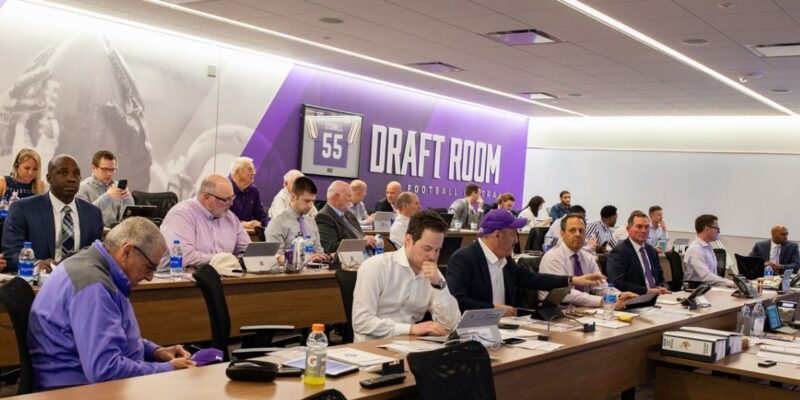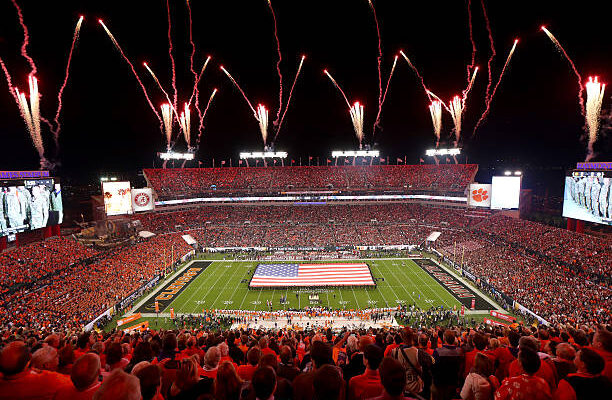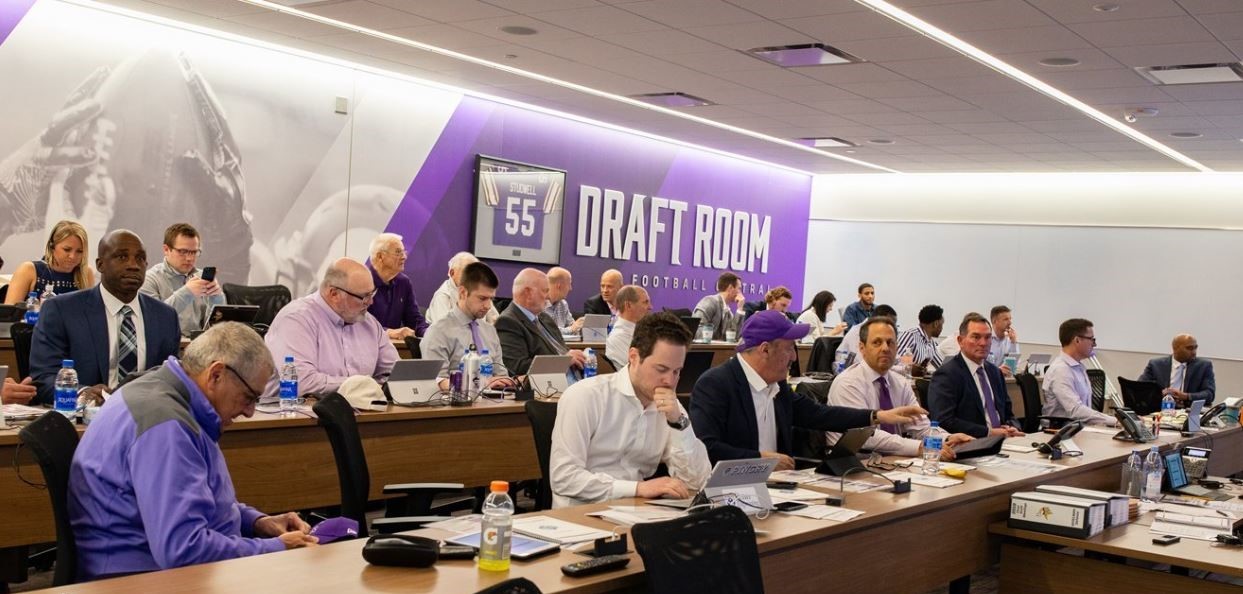The Goal of the Pre-Draft Process from an NFL Organization’s Perspective
During the pre-draft process, the main goal of all 32 NFL organizations is to decrease your value so they can justify drafting you later, and as a result, paying you less. When they test the 40-yard dash at the NFL Combine or your Pro Day, if you don’t possess the speed they believe your position requires, it decreases your value. When they contact your college’s athletic trainer regarding your injury history, if that information leads to concerns related to your durability, it decreases your value. If background checks reveal you have had run-ins with the law and issues related to your character arise, it decreases your value. As an NFL prospect, conduct yourself—on and off the field—in a manner that increases demand for your services and requires the market (NFL organizations) to invest the highest possible draft pick on you based on that demand.
The Reputation of Your Agent and/or His Firm Does Not Determine Your Draft Position
NFL organizations’ draft decisions are made by a combination of the following: the product you display on the field during your collegiate career; their needs at your particular position; your skill set’s fit with their offensive or defensive scheme; and their belief (or lack thereof) in your ability to conduct yourself in a manner that is conducive to becoming a positive member of their community by exhibiting a level of character that is deemed acceptable by their fanbase. Your agent and/or his firm have no bearing on an NFL organization’s draft criteria or your position on their draft board. And anyone that directly states or implies that you will improve or lower your draft prospects by signing with a particular agent is misrepresenting the NFL Draft process.
Nearly 70 Percent of NFL Players Retire Broke
The difference between professional athletes who squander their earnings from their lucrative careers compared to those who don’t has to do with whether they choose to adopt the rich mentality, which is based on defining one’s financial outlook by their income, or the wealth-building mentality, which is based on amassing income-producing assets that generate several streams of passive income. Once you’re drafted, you will be considered a rich person by most standards based on the fact that you will earn a minimum of $750,000 per year. Unfortunately, the vast majority of NFL careers last approximately 3 years. Therefore, in order to achieve financial security, your responsibility is to find a means to use your earnings to acquire income-producing assets that will allow you to financially absorb the inevitable loss of your NFL salary.
In order to do so, it will require you to focus on two of the most important aspects of financial freedom: managing your expenses (because rich people spend a lot of money, but individuals focused on building wealth save and invest their money); and investments (because rich people don’t invest because they spend their money on things that don’t appreciate in value, while wealthy individuals spend their money on assets that accrue value over time). During your NFL career, if you make it a priority to create a detailed budget that allocates at least two-thirds of your earnings to your long-term savings and investments in assets that will increase in value over time, you will achieve financial freedom. Remember, your financial freedom is your responsibility. Therefore, do not entrust it to anyone else. Take ownership of your financial future by becoming financially literate, surrounding yourself with competent and trustworthy advisors, developing a wealth-building strategy, and practicing financial discipline as you execute your plan.
Vet and Hire Your Own Financial Team with Members that Operate Independently
One of the most crucial mistakes professional athletes make is allowing their agent to manage all of their financial affairs. When you build your team of advisors, there needs to be checks and balances on each member in order to prevent fraud, embezzlement, or any form of mismanagement. One of the most common ways to do so is to hire individuals that are separate from one another, that you have personally vetted, all functioning independently, with the purpose of serving your needs in their specialized area. When you employ advisors that operate independent of one another, it doesn’t allow cover-ups or illegal schemes involving multiple individuals of your team to go unnoticed. Another benefit of hiring independent advisors is that it provides you with a diverse set of ideas to ensure that multiple perspectives are being considered in your quest to reach your financial goals.
Think About Life After Football
It is highly likely that your football career will have concluded before you are 25 years-old. Many of you have spent your entire childhood, teenage years, and young adult lives pursuing your dream of competing at the highest level. The downside of that years-long journey is that you have never had time to develop interests outside of your sport. Therefore, when your career ends abruptly, most of you will not have any idea of what other skills you possess. Take time to ask yourself:
Besides football, what else am I good at?
What am I passionate about?
What do I intend to do with my life when my football career ends?
It may be uncomfortable to contemplate answers to these questions because they are accompanied by so much uncertainty and unfamiliarity. But make it a point to formulate honest answers to the aforementioned questions. And let those answers serve as your roadmap to your life after football. You will be pleasantly surprised to discover that the soft skills of leadership, work ethic, and dedication that you developed as a professional athlete will be transferable to other disciplines. And the application of those soft skills will allow you to acquire the hard skills for your post-football professional endeavors.
Be Careful Not to Spread Yourself Too Thin
One of the most difficult aspects of being a professional athlete is learning how to strike the perfect balance between sharing yourself with others and maintaining a level of privacy and anonymity. You will have many requests for appearances, speaking engagements, etc. Therefore, it’s important to understand that as well-intentioned and forthcoming as you may be, being a professional athlete is a time-consuming profession both in-season and during the offseason, and you only have a finite amount of time to fulfill requests that are outside the scope of your contractual duties with your particular NFL organization. As a general rule, prioritize certain requests over others based on your own criteria. And do not make promises you do not intend to honor.
Keep the Main Thing the Main Thing
There are so many professional athletes who get drafted, buy big houses and nice cars, and become more recognized by their nightlife than their production on the court or field. There is absolutely nothing wrong with having a good time and enjoying the fruits of your labor. But don’t ever forget how you got to your “promised land”. It took hard work, dedication, and focus to realize your dream of becoming an NFL player. Don’t allow anything to cause you to deviate from keeping the game of football as your focal point. You have a small window to earn an amount of money that can permanently change your financial outlook. Therefore, take the time to keep yourself in shape, maintain your playing weight, and continue to develop your skills during the offseason. Your knowledge of the game will continue to grow after college, so put yourself in a position to benefit from that knowledge by continually honing the skills required for you to maximize your output on the field.
Be Likeable
Growing up, the game of football was something you played as a hobby; in high school, it was an extracurricular activity; and in college, it more than likely served as a vehicle that provided a means for a free education. But in the NFL, it will be your j-o-b. And like all jobs, managing the day-to-day can be monotonous, draining, and at times, seemingly overwhelming. And individuals that you work alongside that are difficult to get along with—because they have personalities that suck the air out of the room instead of their mere presence bringing life to it—make demanding jobs even more demanding. That’s why it’s imperative to be approachable, easy-going, and likeable in a work environment. The players that are part of the NFL organization to which you are drafted will be your teammates on Sundays, but they will also be your colleagues Monday through Saturday. So first, make sure you gain their respect as a colleague. And that will make it much easier to earn their trust as a teammate.
Understand the Terms of Your NFL Contract
Your contract is a legally binding agreement between you and the NFL organization that employs you. As such, you need to have a clear understanding of it before you sign it. Be sure to carefully read and review every clause of it. If the contract language is too complicated to comprehend, ask your representative to simplify it so you can be clear regarding the obligations it places on you.
Prior to signing your contract, you should know:
–whether the contract terms reflect what was orally agreed upon
–the obligations of both parties, and they should be clearly stated
–the duration of the contract
–how the contract is terminated
As a general rule, if you are not comfortable with any of the terms of the contract, you should express it to your agent so he or she can negotiate those terms on your behalf. A contract is an agreement that allows both parties to “bargain for” their interests, so make sure your interests are clearly made known.
All Professional Leagues Were Not Created Equal
Professional sports leagues operate by written and unwritten rules that provide a basis for one to draw conclusions regarding whether the power resides with the players or that league’s owners and management. For example, based on the NBA’s rules that permit rookies to receive guaranteed contracts and more established players to be awarded super maximum deals; their flexible policy on player availability via “load management”; and a structure that allows for players to be members of an organization’s G- League affiliate and the parent organization and receive incentivized compensation via two-way contracts, one could make a plausible argument that the NBA is a player-friendly league.
The NFL and the NBA are starkly different in terms of their power structure. It is indisputable that NFL owners have structured an owner-friendly league. The overwhelming majority of NFL contracts are not fully guaranteed; the rules allow organizations to unload “bad” contracts by cutting players whose production is inconsistent with their compensation; and instead of flexibility regarding player availability in a sport where major injuries are more common than any other professional league, NFL owners regularly explore ways to add more games to the current 20-game schedule, which would increase the risk of injury to its players.
The NFL is not a league that allows a player to be “grandfathered-in”, where their compensation is primarily based on their reputation and past performance. Instead, it’s a league whose compensation structure is based on the player’s current value to that organization, which is one of the reasons there is so much player turnover. Whether or not you agree with how the league is structured, it’s important to understand its realities and the potential implications those realities could have on your professional career.






